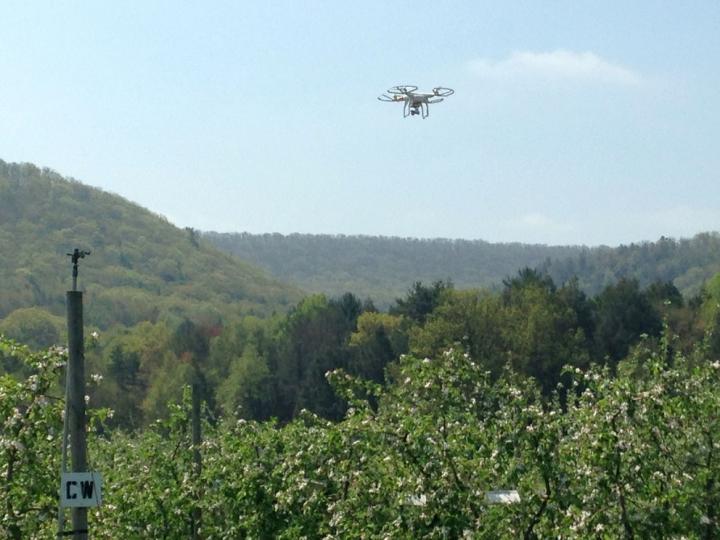
Credit: Courtesy of Joseph Sommer
A system that helps tree-fruit growers avoid frost damage to their crops by using unmanned aerial vehicles, or UAVs, and ground-based robots could be on the horizon, thanks to Penn State researchers, supported by funding from the National Science Foundation.
The NSF’s Cyber-Physical Systems program awarded more than $843,000 to a team led by Daeun Dana Choi, assistant professor of agricultural and biological engineering in the College of Agricultural Sciences. The U.S. Department of Agriculture’s National Institute of Food and Agriculture is a co-sponsor of the project.
Every year, the United States produces an average of 15 million tons of deciduous fruit. For its part, Pennsylvania ranks fourth among states in apple production, which in 2017 was worth more than $117 million. However, unpredictable frost and freeze events can damage crops significantly and cause substantial economic losses.
Methods commonly used by growers to avoid frost damage include sprinkler systems that form ice on the trees to trap the plants’ heat, heaters to warm the orchard, and fans to mix colder air at ground level during a temperature inversion with warmer air higher in the atmosphere. These methods are resource-intensive and can be inefficient and impractical.
Choi explained that this three-year project is aimed at reducing the risk of crop damage by using UAVs, commonly called drones, to monitor air temperatures on nights when there is frost and sending commands to ground robots with heaters mounted on them. In this way, growers can target only those areas most at risk and ensure that all parts of the orchard are protected, while minimizing energy use.
“The project will integrate autonomous vehicles, real-time data analytics, decision making and Internet of Things (IoT) communications to significantly reduce the cost, and increase the precision, of frost protection of fruit trees,” she said.
The team, which includes horticulturists and agricultural and mechanical engineers, first will develop UAV-based sensing systems to monitor air temperature of an apple orchard in real time and evaluate developmental stages of blossoms in the field. The researchers then will use this information as inputs to the decision-making and mission-planning process for an autonomous mobile heating unit. Finally, they will integrate and evaluate communication and cooperative control of the multivehicle system in field tests.
“Frost protection using a novel combination of multivehicle systems for sensing, mission planning and control in real time is a unique application that has never been tested in orchard conditions,” Choi said. “The research will provide powerful tools for frost protection, such as real-time, deep-learning algorithms for determining critical temperatures for freeze damage and mobile apparatus for effective heat transfer in biological systems.
“Successful completion of this project will provide an effective way to maintain crop yield by saving fruit from frost damage and to increase economic profits,” she said.
###
Other members of the research team are Paul Heinemann, professor and head of agricultural and biological engineering, Long He, assistant professor of agricultural and biological engineering, Rob Crassweller, professor of horticulture and extension tree-fruit specialist, David James Lyons, assistant research professor, Penn State Applied Research Laboratory, Joseph Sommer, professor of mechanical engineering, and James Schupp, professor of pomology.
Media Contact
A’ndrea Elyse Messer
[email protected]




